It was 2006 and the legend of Brent Burns and his assortment of hobbies had infiltrated the Minnesota Wild front office. General manager Doug Risebrough, who drafted Burns 20th overall in 2003, had to see what all the fuss was about.
"Come on over," Burns, then in his early 20s, told his boss.
Risebrough found out early on a tour of Burns' house that, yes, his young defenseman did in fact have an area sectioned off for snakes. Burns knew "everything" about the limbless reptiles and hired a local snake expert to care for them.
"This whole thing was the most organized zoo you've ever seen," Risebrough recently recalled with a laugh.
Risebrough's interest was piqued again when the tour led to three high-end bicycles. Burns explained how one was built for speed, another for climbing hills, and the third for paved roads. The GM's eyes widened further when he spotted multiple electric guitars upstairs - seriously?!
What made Burns remarkable then - and still to this day - is that his off-ice interests don't fully define him. He's far from a sideshow, winning the Norris Trophy in 2017 and finishing in the top three in voting two other times. Now a member of the Stanley Cup-contending Carolina Hurricanes, Burns hit 1,400 games played this past weekend. The 39-year-old ranks sixth among NHL defensemen in career shots on goal, 10th in goals scored, 14th in points, and 15th in games played.
Throughout the season, theScore tried to speak with Burns about his accomplished career, his personality, and his many interests, which fascinate teammates and fans alike.
"Do you understand why people think you're interesting?"
"No. No. I think, no. No, I don't," Burns said with a sheepish laugh.
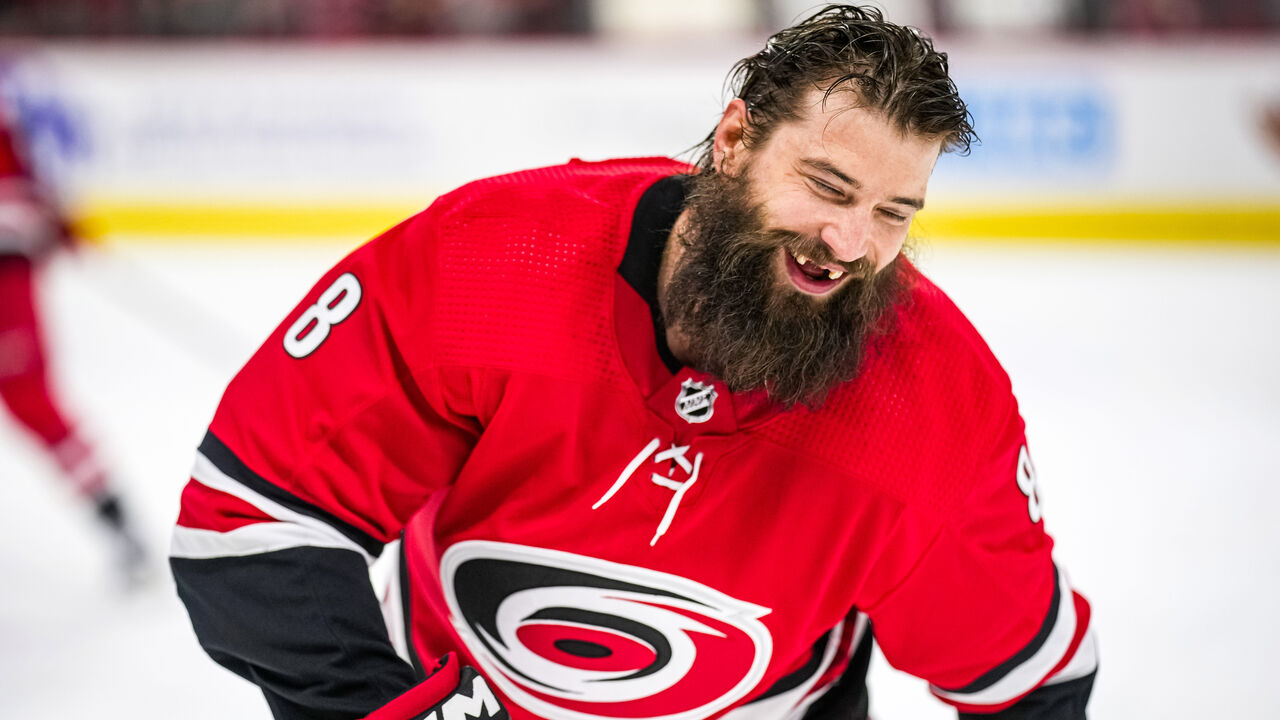
This reflection came at the end of a three-minute walk and talk from the visitor's locker room at Toronto's Scotiabank Arena to the Hurricanes' team bus. His answers were short, and it's an understatement to say he's reluctant to talk about himself.
That's not true about those who know him, though. We asked almost 20 people who've been around Burns throughout his hockey journey to explain and describe what makes him unique. As Alex Stalock, a former San Jose Sharks teammate, put it, "I'll always have endless things to say about him."
(Note: Quotes have been edited for clarity and length.)
'He's always playing so aggressive'
Burns has long been viewed as a rover because of his playing style. He helped revolutionize shots from the point, favoring half-slap shots, snap shots, and wrist shots over full-windup slap shots before his peers did. Burns' 64.5 mph average shot speed this season is in the 90th percentile across the league.
Jaccob Slavin, Hurricanes teammate: Pretty much every shot comes off his stick hard.
Doug Wilson, former Sharks GM: His snapshot from the point is as powerful as most slap shots.
Micheal Haley, Sharks: In hockey, we say, "Put it in your pocket." His pocket, apparently, is huge. Whether his arms are extended, whether the puck is closer to his feet, he has the ability to get it off so quickly and with such power.
Brenden Dillon, Sharks: We'd always joke in San Jose that he didn't have a safety on his hockey stick. That thing was shooting no matter where the puck was on his stick.
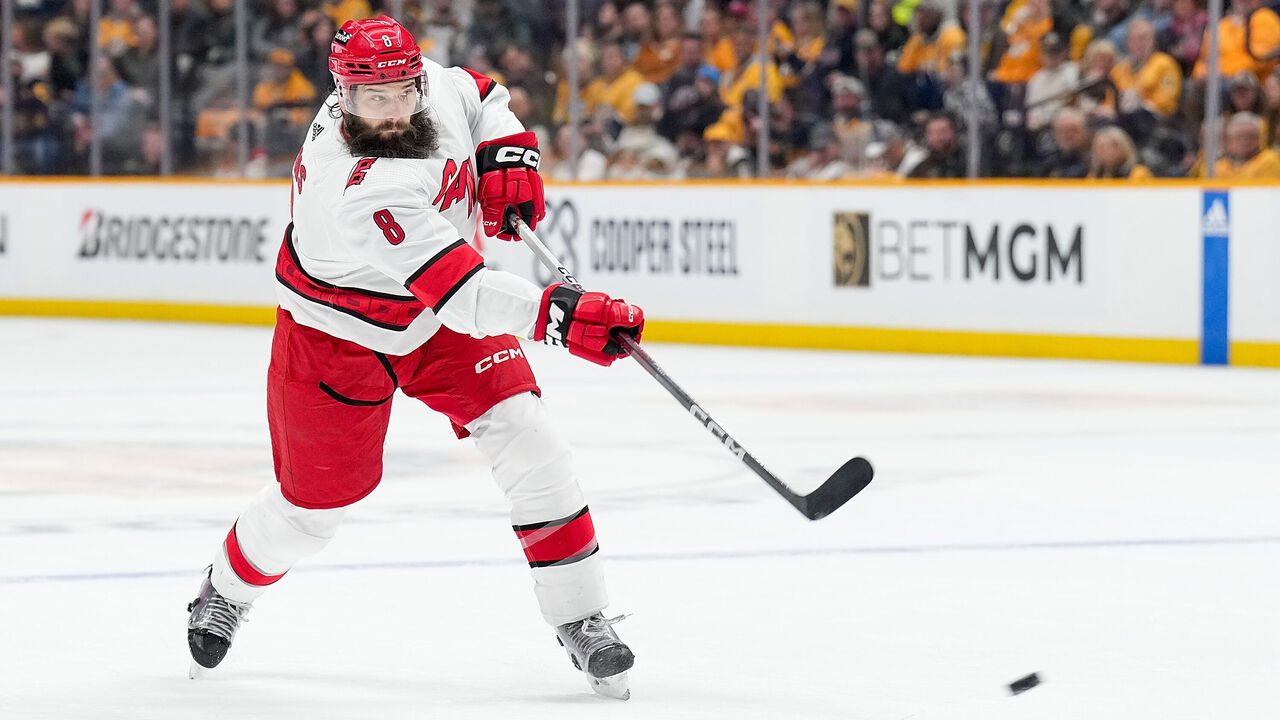
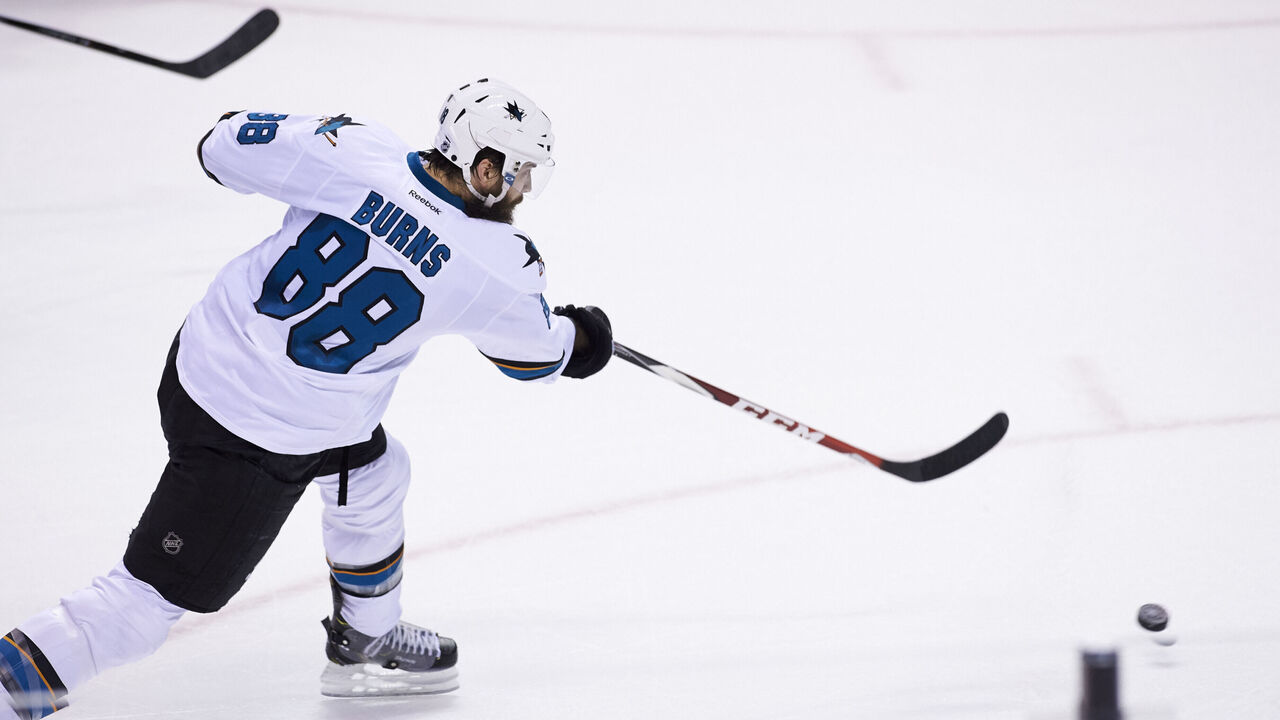
Stalock: Leaving the rink, there were some days when your collarbone was sore because he wasn't holding back when he shot. When he scored, everybody in the rink knew. He'd come up to me after practice and, in classic Burnzie fashion, he'd be like, "You know you're not playing dodgeball, right? You know you're trying to stop the puck?"
Risebrough: Back then, it was slap shots, half-slap shots. Nobody was wristing the puck from the blue line. Nobody. Only Burnzie. It was because of the velocity and the quickness. And now, how many guys take a slap shot from the point? Nobody does anymore. They're all wristers.
Sebastian Aho, Hurricanes: He has a very powerful shot for a guy with a short release. From the same position, he can do a shot-pass where he's looking for your stick. Sometimes, you read him and deflect or tip the puck. Sometimes it's luck, where you're in the right place at the right time. It's good to be aware when he's out there, because you know it's coming.
Paul Martin, Sharks: He's the best I've seen as far as getting pucks through to the net.
Todd Reirden, Houston Aeros (AHL): If the puck is coming from low to high in the offensive zone, he has the ability to one-time pucks or change shot lanes to wrist pucks through.
Stalock: He can pick the puck up off the wall and shoot it in one motion. Him and (former Sharks teammate Joe) Pavelski had such a unique chemistry, with him finding his stick in the slot.
Jari Byrski, longtime offseason skills coach: I built these custom boards so that when you pass off of them, the puck is coming to you in different locations. Almost from the beginning, we didn't practice the perfect pass or shot. Then he worked on quickly adjusting the body and releasing the puck.
Matt Irwin, Sharks: It's a rare combination of skills that he has. Some people might have the size but not the skating, or the skating but not the size, or not the hands and the shot to go with all that. He's got the whole package.
Risebrough: You can really get the wrong impression of Brent in some ways. He plays this enthusiastic game. He does unusual things because of his athletic ability and can recover because of his skating ability. He looks a little bit undisciplined, so to speak. But he's not that way at all. He's super focused on whatever he is doing.
Several interviewees noted how Burns' offensive exploits overshadow his strong defensive work.
Kurtis Foster, Wild: One thing as a defenseman that's tough to do is play super aggressive. A lot of guys are worried about getting beat all the time. I watched Burnzie play the other night. In Year 20, he doesn't hold back.
Dillon: If he's going to pinch, he's all-in. If he gaps up on a forward, he's all-in. If he's going to the corner to get into a physical battle, he's all-in. Combine that with being 6-foot-5, 230 pounds. His long stick. As a defenseman, you appreciate how hard it is to play against a big guy like that.
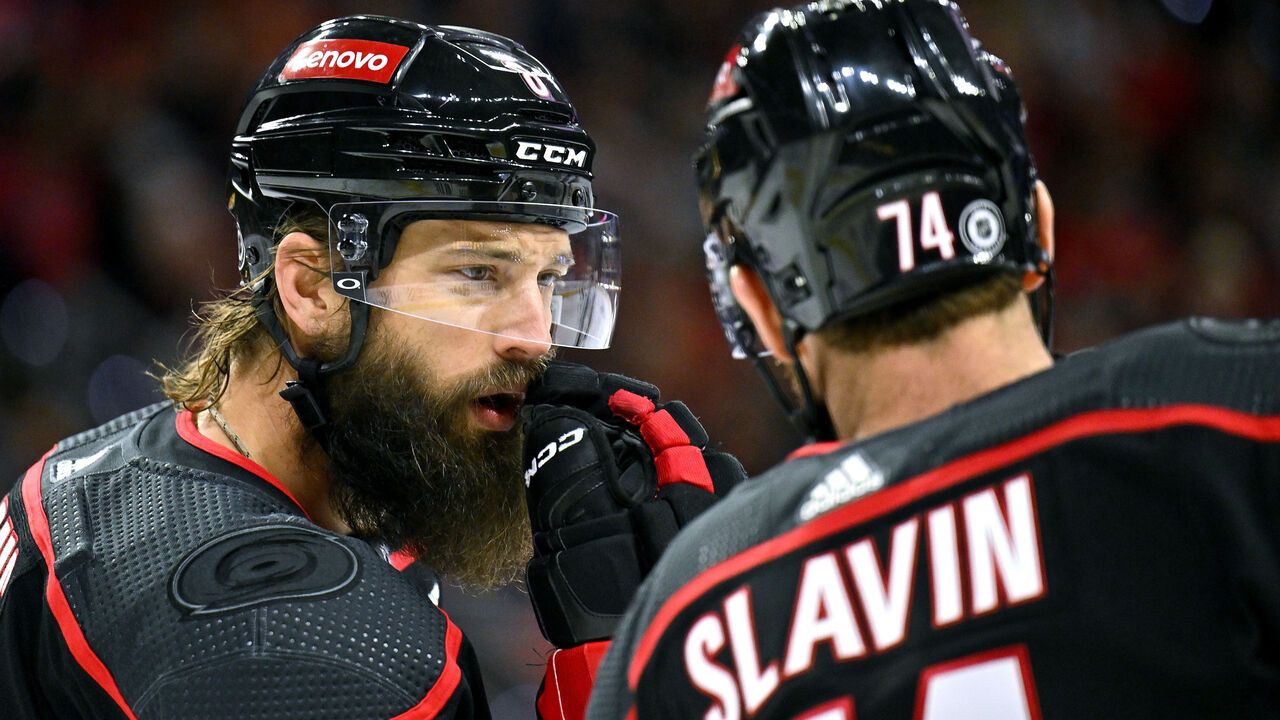
Reirden: He's like Chris Pronger in terms of how (Pronger) used his stick and the range and ability he had to cover large amounts of space on the ice.
Nick Schultz, Wild: For those guys who play so many minutes, your positioning is so important. I think a lot of that came from having Jacques Lemaire as a coach earlier in his career. Being a recent expansion team, we had to play well defensively. Stick positioning was big - where you were on the rink and taking away passing lanes.
Martin: By the end of my time in San Jose, he was a shutdown D-man. He gets attention for being an offensive defenseman. Maybe he doesn't get the recognition as a solid, shutdown defender.
Wilson: He took great pride in competing and trying to stop the other team's top players. I don't think he gets enough credit for that.
Martin: Sometimes he will run outside the dots or make a risky defensive play you don't expect. But more often than not, he ends the play early by causing a turnover.
Foster: Everything has a thought and a reason why he's doing it. He won't necessarily crush guys, but he's always playing so aggressive that guys don't have time to make a play.
Haley: As a coach now in junior, I reference aspects he brings. A lot of times with the D, I'll say: If you guys turn on a Carolina game, you can hear Burnzie calling with his little Tarzan scream when he wants the puck.
Slavin: He talks a lot off the ice - and doesn't stop talking when he's on the ice. He's always trying to help me out.
Martin: Heck, I think the whole rink could hear him call for the puck. He's always hooting and hollering.
Slavin: Sometimes he's talking, and sometimes he's yipping like a coyote. It depends on what mood he's in.
Martin: Sometimes I had to be like, "Hey, quit yelling! I know you're over there."
'He could have played either position'
A multipositional, late-blooming skater out of the Toronto area, Burns spent his NHL draft season as a member of the Brampton Battalion. He began the 2002-03 Ontario Hockey League season far down the lineup.
Stan Butler, Battalion coach: My thought process was simple: It's hard to find good right wingers. Big kid, good hands, can skate well. Why not right wing?
Adam Henrich, Battalion: His story's actually amazing. He was on the fourth line. Our team was pretty good, and then we had a lot of injuries going into the playoffs. He jumped onto the first or second line. When you talk about making the most of an opportunity, that's what this kid did.
Butler: People thought he might go in the second or third round.
Risebrough: The debate I had with the chief scout was why we should pick him high. He said, "Athletic. Tall. I don't know if he's going to get heavier, but he has great skating ability." There was a brief mention about him formerly playing defense, in the context of, if there's something you don't like about him as a forward, it's probably teachable.
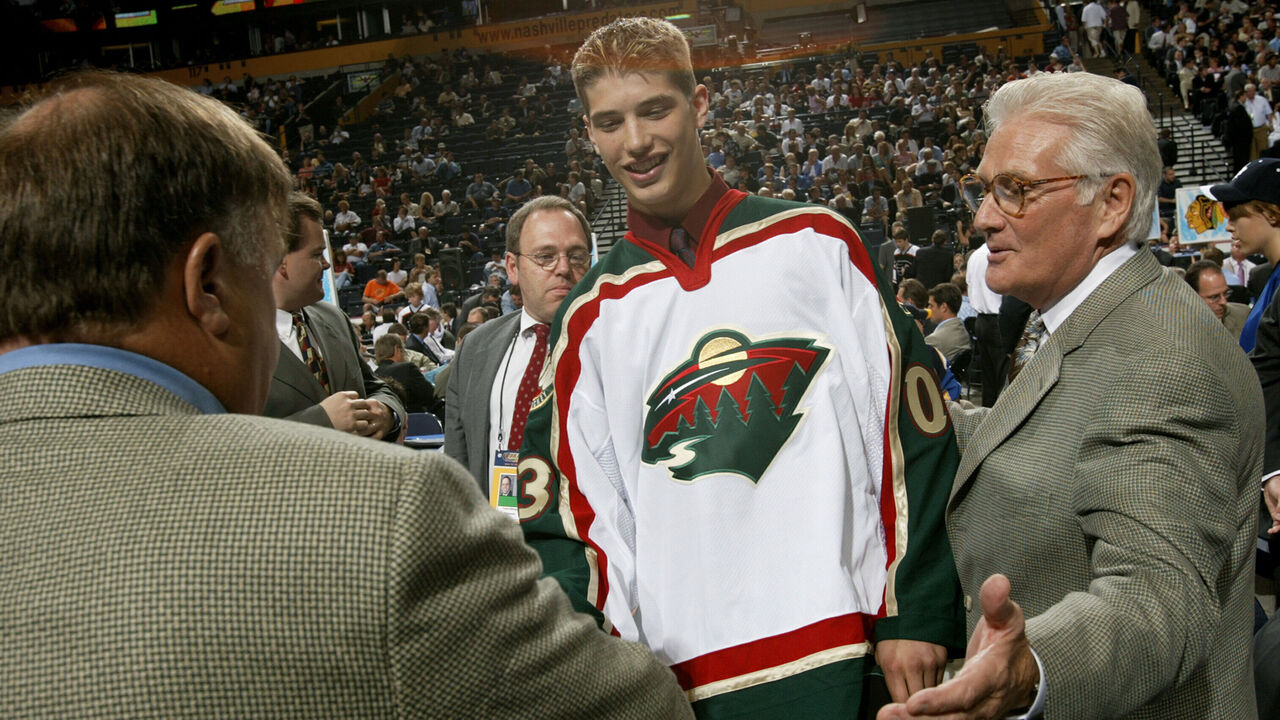
Butler: Then, as the biggest surprise of all, he makes the NHL as an 18-year-old right winger.
Foster: What gave him the ability to stick as such a young guy and play both roles was his skating power. He was a big man who could really move, and he had this confidence with the puck. He wasn't afraid to make a mistake.
Risebrough: He was playing forward for us and he was doing alright. We were happy with him. Big, strong guy going up and down the wings. We were near the end of the season and our team wasn't going to make the playoffs. We had an injury on defense. You'd normally call somebody up, but our minor-league team was right in the playoff hunt. I'm thinking, "Am I going to take the best defenseman off their team before a critical game?"
Risebrough discussed the issue with Lemaire. "Well, don't call anybody up, I'll just put Burnzie on defense," Lemaire told the GM - and that, right there, was the catalyst for a permanent role.
Risebrough: Jacques didn't even know about the history of Brent's time on defense. He just assessed the player and figured he should put Burnzie on defense. And he was great. At the end of the year, Jacques said, "We should think about keeping this guy on defense. He'll develop more because of the minutes he's going to play." It's history now.
Though Burns has been a D-man for the majority of his NHL career, he occasionally subbed in at forward over his 11-year run with the Sharks and rarely, if ever, looked out of place.
Wilson: The only reason we moved him up is he had an injury at the time. He had trouble pivoting and had to get his groin and hip area fixed. He wanted to keep playing. He didn't want to let the team down. But he could have played either position. There are very few guys who could do it to the level he does.
Schultz: He's just a versatile player. He can skate. He can be physical. He can handle pucks. He has a little bit of everything.
Byrski: I always saw him as a defenseman because of his mobility, size, agility, demeanor, personality, passion.
Scott Hannan, Sharks: You look at how he plays on the blue line and the aggressiveness he portrays. He pinches a lot. He's in people's faces. That allowed him to play forward with the same type of mentality.
Foster: He made stuff happen that left you speechless on the bench. I remember there was a game where he had a shootout goal. He did a move like Pavel Datsyuk. We were all blown away.
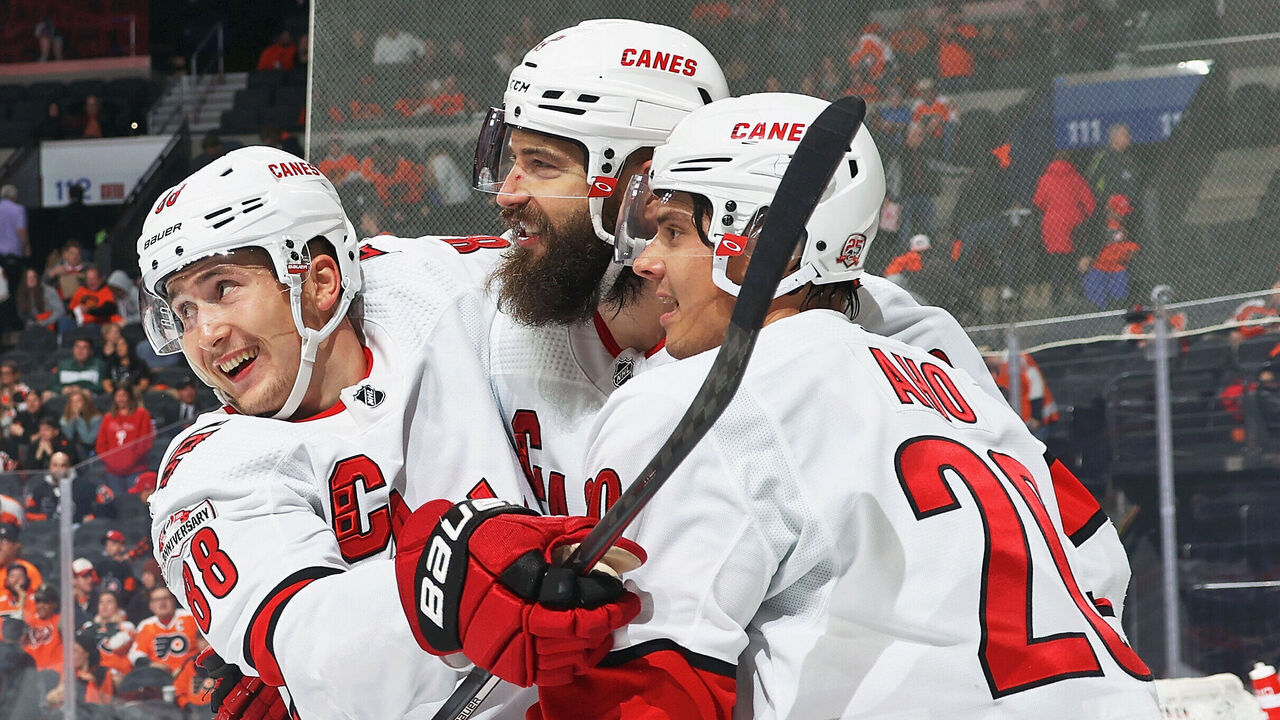
Few players switch from forward to defense as young pros. Even fewer dominate for decades at that new position. In his late 30s, Burns continues to log serious minutes (21:46 per night). He's played in 830 consecutive games, tying him with Andrew Cogliano for seventh on the all-time ironman leaderboard.
Haley: When I think of ironmen like Burnzie and Keith Yandle and Patty Marleau - guys I played with - it's their conditioning. Burnzie likes to try different stuff. He's not always conventional. He likes to do a lot of grappling. He's always stretching. He's doing Pilates. He's always taking care of his body.
Tomas Hertl, Sharks: I can say the same thing about Jumbo (Joe Thornton), Marleau, Pavs. They do massages. They work out every day. They try to eat healthy. You need some luck to avoid big injuries. All of these guys did everything to be in great shape and play in the league for a long time.
Stalock: At his house in San Jose, he had a facility in his backyard that had a sauna, cold tub, therapy room, gym.
Devan Dubnyk, Sharks: He's very methodical in his routine.
Stalock: People see him at 7 p.m. every night. He's the finished product then. They probably think he must be blessed with talent, which he is. But every day he's shooting a couple hundred extra pucks, scooting around, and getting better at whatever he wants to get better at on the ice.
Butler: He's right up there with another defenseman I coached a long time ago in Prince George of the Western League: Zdeno Chara, who's running marathons now. Both of those guys, I don't want to say they're "freaks of nature," but you know what I mean.
Wilson: Elite-level fitness. Nobody trains harder than him. And then his toughness and fortitude. He was like Jumbo and Marleau: He didn't want to miss games. Their love for the game is they didn't want to let their teammates down.
Schultz: Anybody who's played understands how much of a grind it is to play an 82-game season. In San Jose, they had good teams and played deep into the playoffs a lot of years. That's a lot of miles on the body.
Haley: It's not like he's playing on the outside. He's a D-man who's bumping and grinding. He plays with his body, blocking shots.
Hertl: The best leadership he shows is his work ethic.
Aho: He's an older guy who's gone through a lot in his career, and yet he's still one of the first guys out there for practice.
Dillon: It's insane. This is a guy who plays 25-plus minutes a night. He plays against the other team's top line. D-zone. O-zone. A physical guy. He's really checking all the boxes. For him to stay as healthy as he's been, that's a tribute to how he takes care of himself.
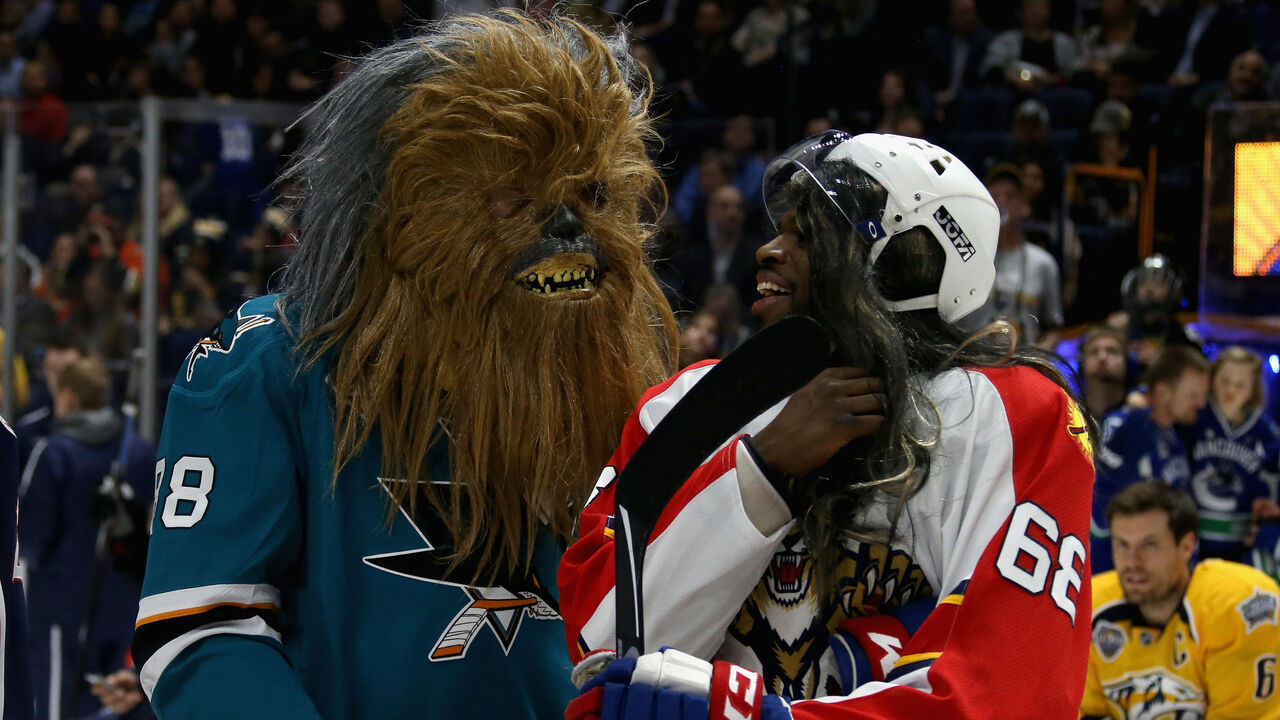
'So childish in a good way'
Not many NHLers would pose naked alongside a teammate for a magazine photoshoot. Or cheerfully refer to themselves as a "goofy donkey." Or, in a crazy turn, find themselves fighting off a biting cheetah during a special behind-the-scenes zoo experience on a day off on the road. But that's Burnzie, a character known to amuse and befuddle teammates and coaches.
Dubnyk: Our first day, we were in Scottsdale, Arizona, for training camp. Everyone's showing up at different times. Burnzie had driven there. He's set up in the parking lot. He's got a Traeger grill in the back of his truck. He's sitting on a lawn chair smoking meat. That was Day 1 of camp. He'd ride his bike to the rink. A lot of quirky stuff.
Foster: He's got a magnetism about him. Guys gravitate toward him. He really can be a guy in a dressing room (who) everybody respects and wants to be around.
Hannan: He's messing around with you all the time. He's such a character in the room.
Dillon: I sat beside him for six years. In the morning, he'd talk about the politics from the night before or the basketball game or the football game or the hockey highlights. We had so many things that we were able to chat about.
Stalock: He didn't change his personality at the rink or away from the rink. Brent Burns is Brent Burns 365 days a year.
Wilson: He was just real. Every day, I'd walk into the building and I'd hear Burnzie and Jumbo. The energy, it was almost childlike.
Stalock: Their voices carried, and it just put a smile on your face. You can go through bag skates, you can get yelled at by coaches, but if you have a tight group that likes to have fun, you can get through those trying times. And, of course, when you're winning, it makes everything so much better.
Schultz: He's probably one of the most interesting guys you'll ever talk to or come across.
Slavin: But he's also one of the nicest. He truly cares about all of the guys. He wants what's best for everybody.
Stalock: What I found from him that I try to impress on young guys is to be yourself. Don't try to be anything that you're not. That's one thing Brent has such a good feel for. He is who he is. What you see is what you get. There's 23 different personalities in a locker room, so to go into a room and feel like you can be yourself and act like a kid at times but also be a professional, to me, as a young pro, it was very refreshing to see.
Burns is restless and insatiably curious. He reads, surfs, cycles, camps, and noodles on the guitar. Other passions include knives, pirates, reptiles, tattoos, wine, pizza, and the military. Friends struggle to keep track of his hobbies.
Stalock: Oh, God. There's 100.
Dillon: I lived at his house for four months while his wife was renovating my condo. I got to see in-depth the everyday life of the Burns family. Karate. Cold tubbing and (a) sauna in his backyard. Pool days. Video games. There wasn't an activity that we didn't cover together.
Schultz: One summer, he traveled around in his six-wheel camper and was riding his bike out of the back. He's open to anything.
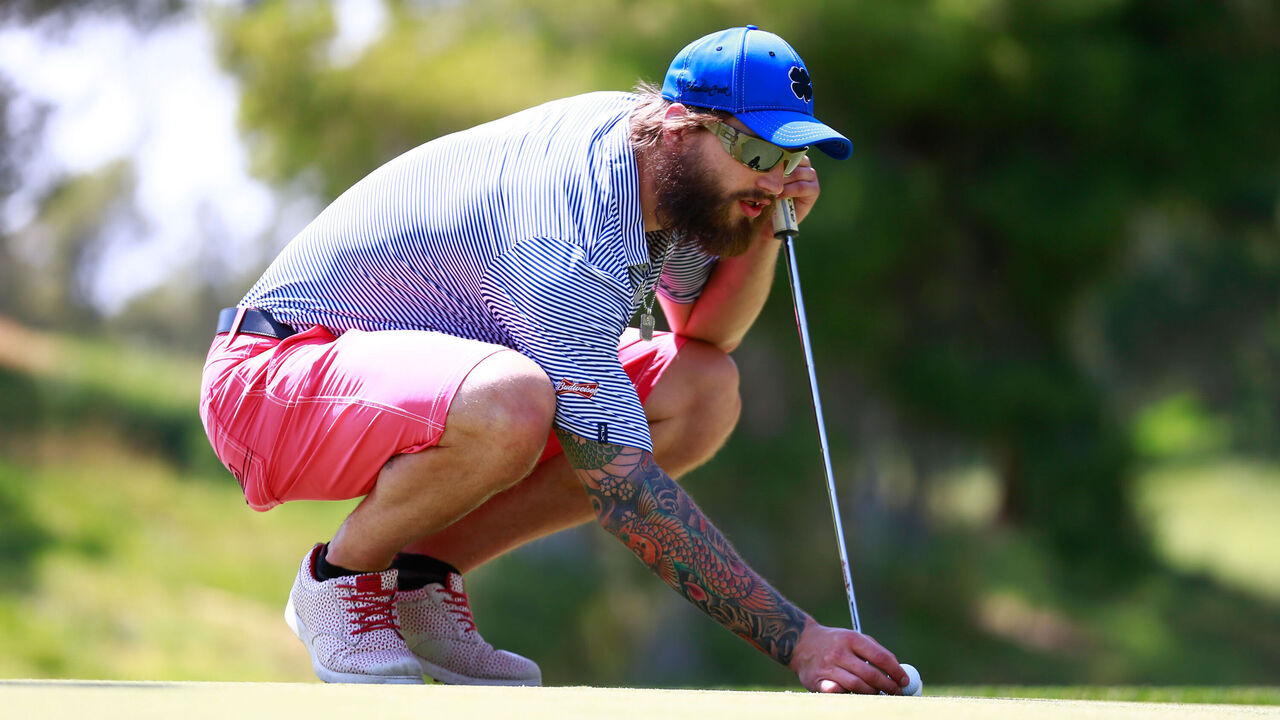
Dillon: You'd tell him, "Hey, we're going to golf as a team tomorrow." He's like, "Ah, I haven't golfed in over a year." He'd come out and have the best clubs, the best outfit, a hilarious get-up, and he'd shoot really well.
Byrski: When he commits his interest in something, there's no halfway through it. He'll get down to the core.
Dillon: It was similar with martial arts. How much can a guy who plays hockey for a living really know about it? But we'd be joking around on the trampoline with the kids, and then he'd have me in a headlock in the backyard on the grass with our shirts off.
Haley: Our soccer warmups were intense. I was a fighter, but most of my bruises came from soccer balls to the head. You couldn't do anything with Burnzie that doesn't turn into a competitive game.
Slavin: He loves to learn. He loves to have fun. He loves to grow as a person.
Wilson: He's fascinated by things. He's accomplished a lot of different things in his life that you wouldn't say would be typical of a hockey guy.
Dubnyk: I'd sit on the stationary bike with him after the game and ask him questions about the ranch he has in Texas. He's got zebras and wildebeests.
Irwin: He seems to have an unbelievable setup with exotic animals. Things you wouldn't think you would have as a pet, so to speak. I'm not quite sure if "pet" is the right term.
Dillon: Most people on their off day watch TV shows. He's looking up what new animal he wants to get for his ranch.
Hannan: You'd talk to him about what he has to do to feed and breed them to help the livestock maintain stability. It's amazing, the depth at which he goes into it.
Wilson: We got him a special gift (two antelopes) for his 1,000th game. It was the first time we bought an animal for a player to celebrate 1,000 games.
Foster: He had a little Komodo dragon (at his Minnesota home) at one point. He was feeding it different animals. It made going to visit suspenseful and interesting.
Henrich: Guys in the OHL would go to movies. Burnzie would go home and read "Harry Potter." Now he's into snakes. He beat his own drum, which I respected.
Foster: You know what's funny? All the pictures and videos I see of him now, he always has an Army backpack. I don't know what he's got in it.
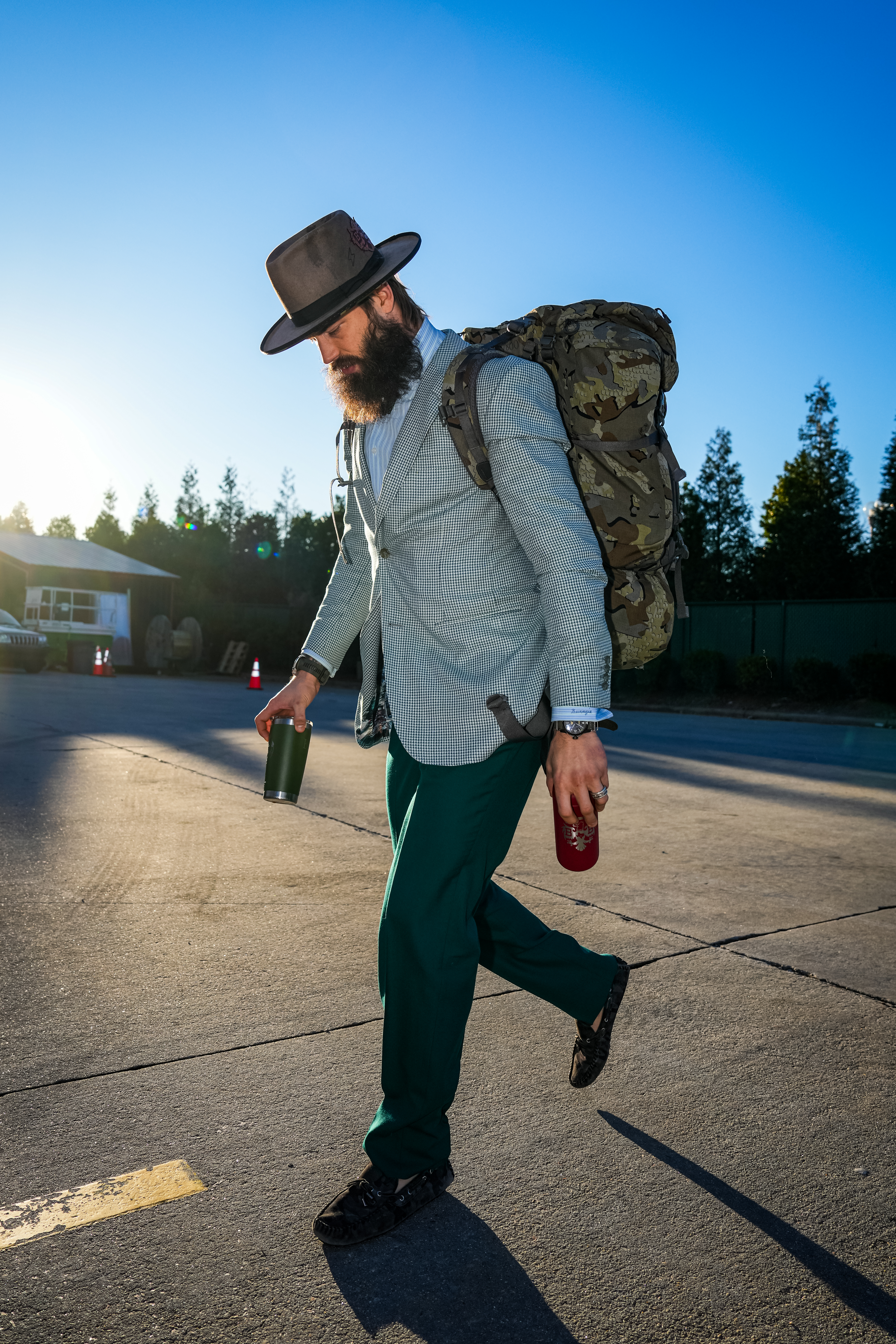
Stalock: I'm sure he has all of his rehab tools in his bag. He never let us take a peek in there.
Irwin: It was a mystery, always. When I was in San Jose, it was a big, green camo backpack. I know he had a coffee machine. A foam roller.
Seth Jarvis, Hurricanes: No matter the road trip - like, if you go to New York for one day - he has six luggage bags. He's got his coffee machine. He's got his blender.
Stalock: We sat close to each other on the plane. The seat next to him was for his luggage. We'd be flying somewhere close - to L.A. or something - and he'd walk up with the fruit tray from the back. Guys would be playing cards, and all of a sudden, you'd hear the grind: Aaaaaaarrrrrrrrrr. You look over and Burnzie's blending a smoothie in his seat. It's like, "You have to be kidding me! What do you have in that bag?"
Jarvis: He's got bags I can probably fit in. I don't even want to know what's in there. Yeah, he's a character.
Haley: A giant, hairy kid. His outlook on life is so childish in a good way. I think that's played a huge part in his longevity and why he's so good at his age. He loves to play the game of hockey and games in general.
Risebrough: He gets personal satisfaction in the process of doing things, not just the end result. Some people who are detail-oriented can drive you crazy because they're so intense and they want everything in a perfect way. Burnzie's not like that. There's a detail element, but he's doing it with a spirit of improvement and enjoyment.
Irwin: He's interested in so many things outside of hockey. It makes him a unique individual you want to be around. You want to hear the stories. You want to have an ear to the ground on what makes Burnzie tick.
Burns' hairiness is iconic. Fans can spot his bushy beard from the nosebleeds. His eccentric look, intensified by a wide gap in his teeth, is symbolic of his goofiness and rugged playing style.
Hannan: When you look at that, you're like, "That's a hockey player."
Risebrough: He looks like an unkempt bed.
Foster: Everybody knows who he is because of the beard and the teeth.
Dubnyk: That's him in a nutshell. Missing teeth and the big beard, it fits his personality. He's always smiling and making jokes.
Hannan: He's such a big personality and guy. The beard became a persona. Almost like a superhero.
Dubnyk: It's really weird to see a picture of him early on in Minnesota with no facial hair.
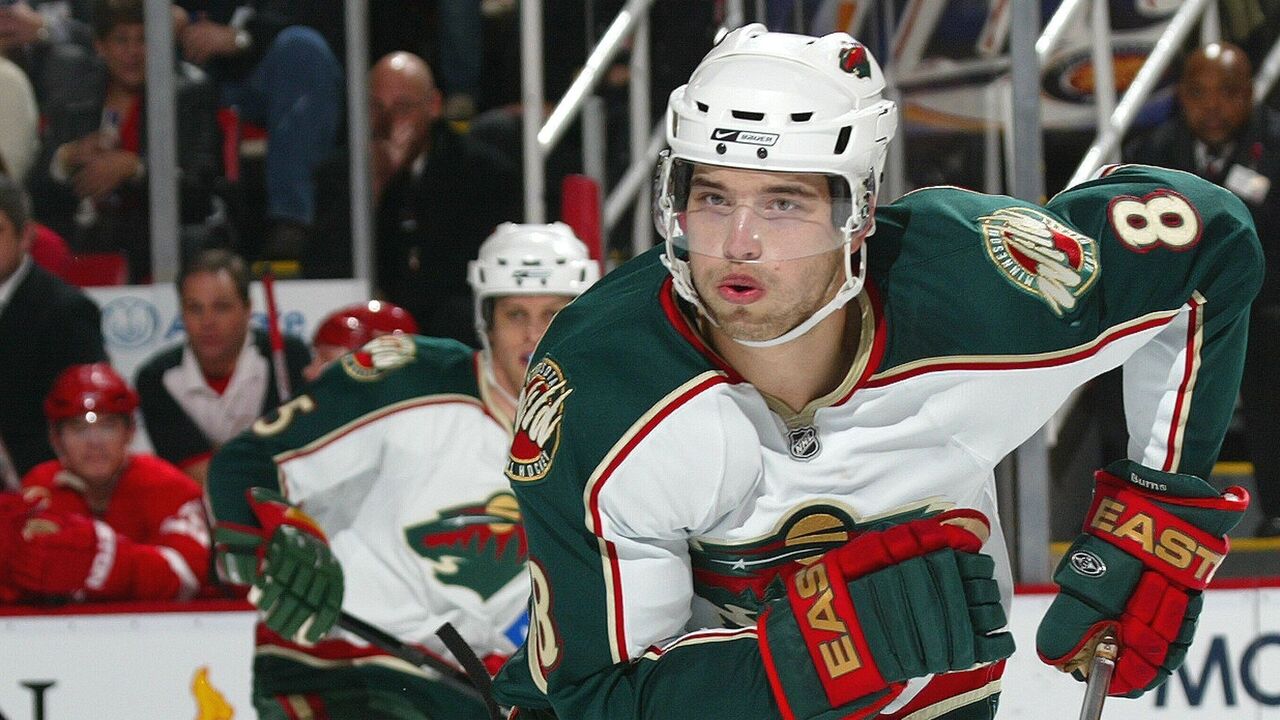
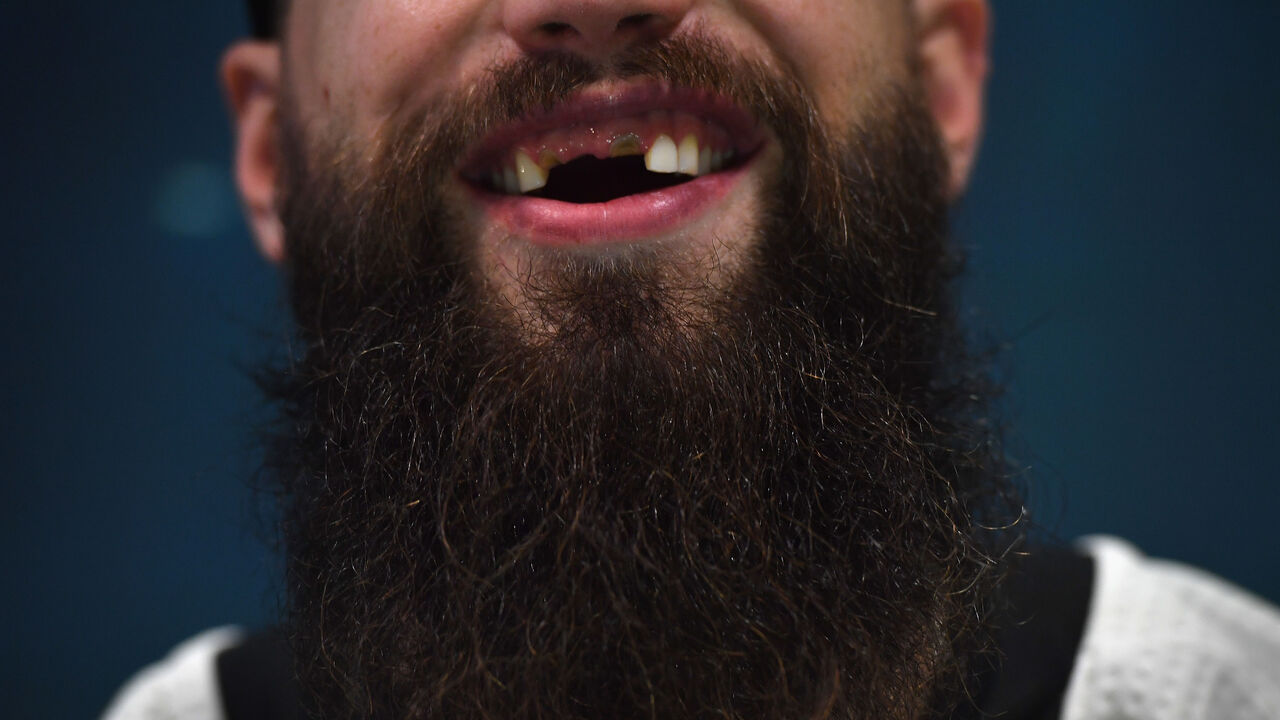
Dillon: After we went to the Cup Final in 2016, he'd been growing that beard for two months in the playoff run. Maybe Mrs. Burns was a big fan. He kept it as a lifestyle beard.
Dubnyk: I don't know if he'll ever get rid of it. His kids would probably cry if he shaved it off. They'd think he's a different person.
Foster: He looks scary with the big beard, but he's the farthest thing from it.
Hannan: He's a guy who takes the day as it comes. He has a lot of energy and zest for life. That was contagious with the Sharks.
Butler: When I watch him now, he's the same person he was when he was 17, minus a few tattoos and a lot less hair on his head.
Stalock: He's got the hair that changes every year. With Brent, something that hasn't changed in 20 years is his love of not only the game, but also his teammates. Every teammate from Minnesota to San Jose to Carolina would say how incredible a person he is. It extends to his family, too.
Foster: He's a family man who cares about other people. My older boys are 12 and 10. They love the NHL. When they have friends over, it's one thing they show them right away: "Look who sent us a Christmas card!" They're like, "Oh, my God. Why does Brent Burns send you a Christmas card?" It shows how good he and his wife, Susan, are. We were lucky to call them friends for a long time.
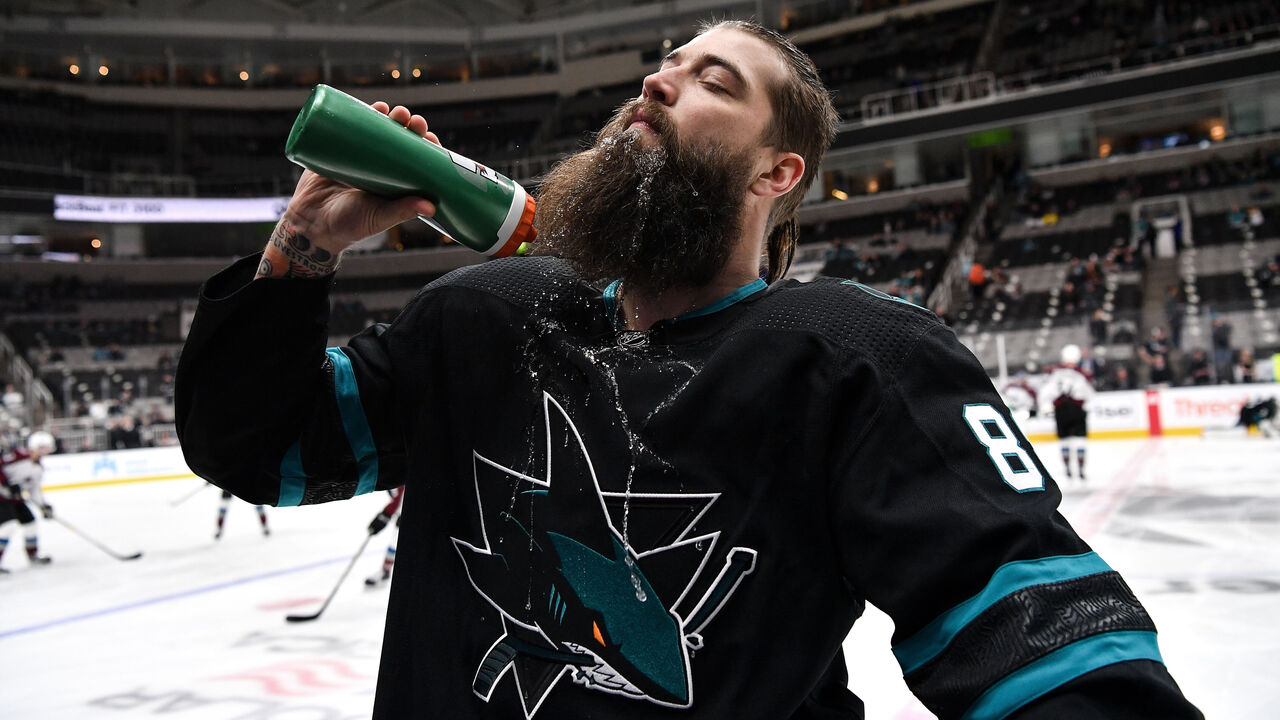
Schultz: Most kids, you're a byproduct of your parents. Burnzie's mom and dad are wonderful people. I remember his dad coming into the Xcel Energy Center during practice. His dad was running stairs with a black leather Minnesota Wild bomber jacket on. Absolutely leaking.
Slavin: His dad came to the rink as he was settling in here in Raleigh. His dad's sitting there riding the bike in the workout room. He's got his headphones on and he's air-drumming the heck out of that bike. I guess he's a drummer? So he was just at home. He was having a concert there by himself.
Dillon: He loves his family so much. The time he puts in at home with his two daughters and son, I feel like he's there as much as he possibly can be.
Henrich: You look at a video of his 10-year-old son's team in Carolina. He went on the ice, wore his full equipment from the NHL, and was doing the drills with them. I started laughing because most guys wouldn't do that.
Slavin: Two summers ago, his boy Jagger was with us, and we're out there during one of the captain's skates. We're working on tipping pucks. Jagger gets in front of the net, and I'm thinking Burnzie will just float them into him. No, he ripped them as hard as he would have if Jordan Staal was standing in front of the net.
Haley: He only has one speed, and it's "go."
Slavin: Jagger got in front of one shot in the wrong way, and it hit him right in the private parts. You're thinking, "Oh, man, here come the tears." But Jagger just popped back up and was like, "Gimme more!" That's exactly how Burnzie would react, too. He plays through everything. He just grinds.
'Lots of hockey left in him'
Burns, the NHL's third-oldest defenseman, is the only active skater who debuted before the 2004-05 lockout. A championship still eludes him. Deep postseason runs with the 2016 Sharks (reached Cup Final), 2019 Sharks (lost in West final), and 2023 Hurricanes (swept in East final) didn't deliver the ultimate prize.
Wilson: When we acquired him, I said, "Brent, there's a couple of goals we have for you. One is to win a Stanley Cup and one is to win a Norris Trophy." He's won the Norris Trophy. I wanted to see Jumbo and Patty and Burnzie win because of everything they've done for the game.
Martin: 100%. He'd be at the top of the list. Pavelski is another one. As far as guys who I played with and enjoy watching, Brent definitely has earned the right to raise the Cup.
Risebrough: A lot of good players don't get that moment. A lot of them are in the Hall of Fame. Ray Bourque played how many years, and then finally got the Stanley Cup. You hope it happens. But it can't overshadow what you've accomplished throughout your career.
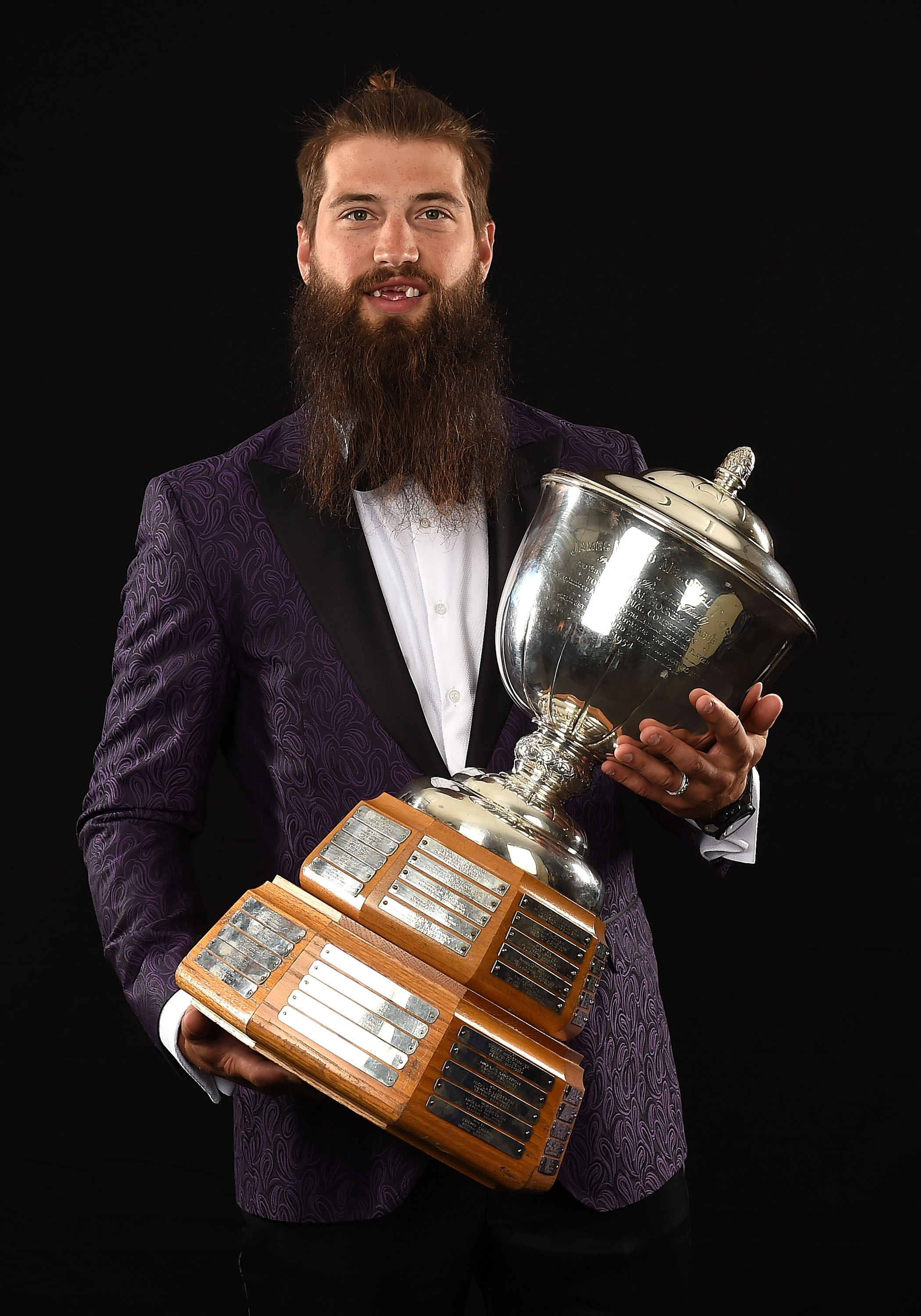
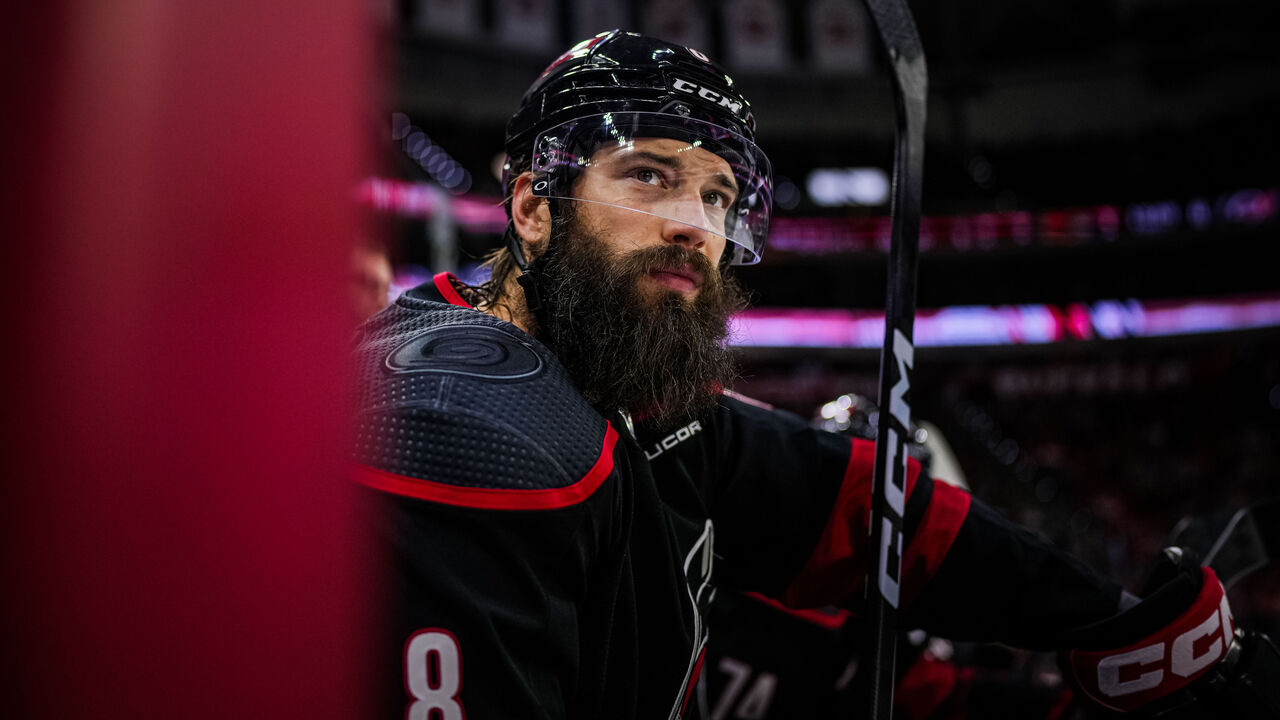
Reirden: He's going to be remembered as one of the most physically gifted defensemen to play in this era. He's opened the eyes of the NHL in terms of creating offense from the blue line. You see that in the up-and-coming defensemen who are high-end offensively, whether we're talking about Cale Makar or Quinn Hughes. One person who started that transition was Brent Burns.
Hannan: I think it's going to be harder to reproduce his longevity moving forward. The game's gotten faster and quicker. You get to a certain age and it's hard to keep playing in the league, let alone contribute at a high level. Obviously, he's a physical specimen.
Wilson: He's got lots of hockey left in him.
Dubnyk: He's still one of the best defensemen in the league. There's no reason he won't continue to play.
Henrich: I did the same training as him in junior. Burnzie would stay on the ice for five hours to do drills he was taught. If you love hockey and stick with it and don't let your position in the lineup or external things bother you, Burnzie's a good indication that anyone can have an opportunity to make it.
Stalock: There are people who shape you and steer you in the right direction as a young pro, as far as what's acceptable and how to have a long career, and Brent's one of those players.
Martin: I enjoyed my time with Brent. I was fortunate to play with Scott Stevens, Scott Niedermayer, Kris Letang, Brian Rafalski - a lot of really good defensemen. That's probably why I got to play for as long as I did. (Laughs) He's up there with some of the best to ever lace 'em up.
Hannan: I like to tell the story of the last game of my career. It enveloped everything. We had a lot of camaraderie. In the last game I played in the NHL, we were going back behind the net. I was yelling at him, "Time! Time! Time!" He thought I said, "Man on!" He turned, ripped the puck out of the zone, and accidentally hit me in the face.
Stalock: There were so many Burnzie stories where you're just like, "What the hell are you doing?" There's story after story with that guy.
Hannan: I had a goal in that (last) game from Burnzie passing me the puck back door for a tip-in. After the game, he and his wife called me on FaceTime. There were always jokes about the size of my head. He was like, "I can't believe I missed that thing." I'm like, "Burnzie, you cracked my orbital bone in three spots!" His wife starts punching him in the arm and calling him an idiot. He starts laughing.
Haley: He's a 6-foot-5 sasquatch, but he's like a child.
Hannan: That's the type of guy he is: He wanted to call me right afterward and see how I was doing because I was at the hospital. We still had that goofiness. That was my last year in the league. I got a chance to play with Burnzie and that brought a lot of joy to the game for me.
John Matisz is theScore's senior NHL writer.
Nick Faris is a features writer at theScore.
Copyright © 2024 Score Media Ventures Inc. All rights reserved. Certain content reproduced under license.